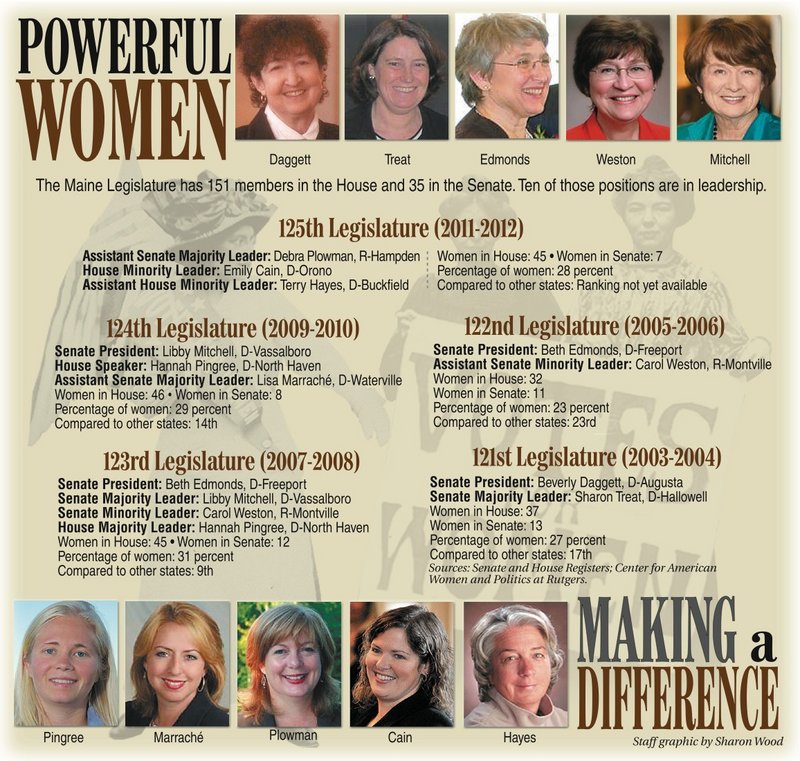AUGUSTA – Ellie Espling has four children who range in age from 3 to 15.
She’s 37 years old, energetic and a Republican.
Espling, of New Gloucester, is one of 18 Republican women in the Maine House of Representatives — the highest number since 1990. Of those, 11 are new to legislative service.
“I’ve always said I could sit home and complain. And I decided rather than sit home, I would do something to bring change,” she said.
Espling and her colleagues are serving in what’s poised to be a transitional year for women in the State House, after a two-year stretch during which women occupied some of the state’s most powerful political positions: House speaker, Senate president and attorney general.
While the number of women serving in the new Legislature — 52 — is similar in number to recent years, there are more Republicans and women of child-bearing age.
“Usually we find women with teenagers, grown children or no children,” said Assistant Senate Majority Leader Debra Plowman, R-Hampden.
Plowman, whose legislative service dates back to 1993, remembers the late 1980s and early 1990s when Maine ranked as high as second in the nation for the percentage of women elected to the Legislature.
In recent years, Maine has slipped to 13th, according to the Center for American Women and Politics at Rutgers University.
This year, there are seven women out of 35 senators and 45 women elected to the 151-member House.
In the Senate, three women are Republicans and four are Democrats. While Republicans have seen gains in the House, both overall and in the number of women, there are still far more Democratic women in the chamber.
That’s partly due to training programs aimed at getting Democratic women interested in public service. This year, there are 27 Democratic women in the House.
For the last few cycles, Democrats have participated in Emerge Maine, one of nine such programs in the country. In 2010, eight graduates of Emerge Maine were elected to office.
Two graduates — Rep. Maeghan Maloney, D-Augusta, and Rep. Erin Herbig, D-Belfast — won their elections this cycle.
Herbig, 29, and Maloney, 39, are looking to make a difference with their service right away.
Like Espling, both are Maine natives who want to create an economy that encourages young people to stay in Maine.
After graduating from Boston College, Herbig returned to Maine.
“I think we need more energy in Augusta,” she said. “I see too many of my contemporaries leaving the state because they don’t feel any sense of economic stability.”
Herbig and her husband are both from the midcoast. All of their siblings have moved to other states.
Maloney, a Harvard University law school graduate with three children, said she wants to make sure welfare programs are there for those who need them. As a child, she said she lived with her family in subsidized housing and was on food stamps for a time.
“I think it’s important that, when we look at poor kids, to see that there’s potential there, just like all kids,” she said. “We need to make sure everyone has those same opportunities.”
Legislative leadership looks a lot different this cycle than two years ago, when the House and Senate were run by women.
In fact, new Senate President Kevin Raye, R-Perry, follows three consecutive female Democratic presidents in the last eight years.
This time around, Plowman is the highest ranking female leader in the Senate. In the House, Minority Leader Emily Cain, D-Orono, and Assistant Minority Leader Terry Hayes, D-Buckfield, are the only women in leadership.
At age 30, Cain is one of the 10 women younger than 40 serving in the House this session.
Sarah Standiford, executive director of the Maine Women’s Lobby, said Maine has been fortunate in recent years to have so many women in top leadership positions, including Attorney General Janet Mills, Senate President Libby Mitchell, House Speaker Hannah Pingree and Maine Supreme Judicial Court Chief Justice Leigh Saufley.
Of those, only Saufley will continue in her position in the new year.
“We have every hope and expectation the leadership pipeline will continue to be cultivated,” Standiford said.
She’s also hopeful that Gov.-elect Paul LePage, a Republican, will appoint women to high-level positions in his Cabinet. She praised outgoing Democratic Gov. John Baldacci for appointing women to positions of leadership.
Rep. Kim Olsen, R-Phippsburg, said she decided to run for the House in July after another candidate dropped out.
The 39-year-old mother of two is a carpenter who works with her husband in their residential construction company.
“As a small-business woman in a tough business climate and tough economic climate, we as a family have had ongoing concerns,” she said.
One of those concerns is the cost of health insurance, which forces the family to decide whether illnesses are “doctor-worthy,” she said.
Olsen is a Maine native who grew up in Phippsburg, graduated from the University of Maine in Orono and settled next door to her parents.
She said “being a mother of two school-aged kids and a self-employed businesswoman” — and having no political experience — were reasons voters elected her.
Incumbent Rep. Meredith Strang Burgess, R-Cumberland, said it’s important for the Legislature to look more like the demographic makeup of the state as a whole. “We have smart people all over the place — and some of them are women.”
Send questions/comments to the editors.


